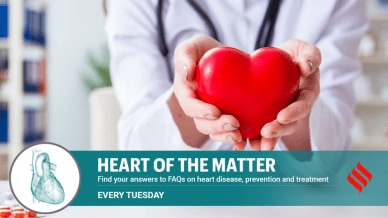Heart attack warning my patient, 31, ignored: Chest pain lasting seconds a week before
Roughly one-fourth of patients experience heaviness and pain at least a week before or within a 24-hour window

“Just about a week ago, I had a brief chest discomfort that lasted about 10–15 seconds. It came like a wave, I felt pressure and a squeezing tightness on the left side of my chest. During those few seconds, I couldn’t take a deep breath properly, and then it went away on its own. It came like a wave never to appear again. I thought it was stress, lack of sleep or a digestive issue,” said my 31-year-old patient after he was recovering from a heart attack that needed a procedure to open up his blocked arteries. He was worried if he had ignored an early sign of a heart attack.
Now all patients do not get signs and symptoms but roughly one-fourth of patients do experience heaviness and pain at least a week before or within a 24-hour window. If your symptoms are nothing like you have ever experienced before and come and go in a wave, leaving you uncomfortable, then get yourself evaluated, just to be sure. Usually, 90 per cent of those who get tested are found to have gastric issues but 10 per cent do have a heart problem. My patient was a smoker and had a stressful job, all underlying triggers but did he ignore warning signs?
What symptoms can you get before a heart attack?
My patient experienced prodromal symptoms, basically symptoms that mirror those of a heart attack in short spells. Some people experience typical symptoms; some are atypical while others do not experience any symptoms at all.
Among symptoms, the most common is some sort of chest pain in the days before the heart attack. According to a 2023 cross-sectional study, 68 per cent people experienced it preceding their heart attack. The same study found that 44 per cent of subjects had complained of chest heaviness, tightness or pressure and rapid exhaustion. The last is usually evidenced by heart palpitations, which means your heart is pumping too fast or too hard.
Watch out for shortness of breath, which may happen both during activity and at rest. It feels like your lungs cannot draw in enough air. Some patients report a burning sensation in their chest in short spikes. If this keeps on happening, get yourself evaluated.
Sometimes patients may feel momentarily dizzy and lightheaded, although they may not have a history of blood pressure issues. That’s reduced blood flow to the brain associated with the heart not pumping as effectively. Stomach discomfort, nausea and vomiting can be indicative if you do not have a history of them at all or cannot pinpoint a trigger. Some patients complain about sudden anxiety bouts, sleep issues and wakefulness. Some may feel breathless while lying down. Watch out for a sudden onset of swelling in your legs and ankles. When blood does not circulate in the body as it should, it can back up in the veins and cause swelling. Similarly, watch out for unusual pains in your arms, back, jaws or neck.
Are symptoms different in men and women?
While both may feel chest pain, women may report breathlessness, nausea, back pain or jaw pain, some dizziness, indigestion and extreme fatigue. Because these are mild and come and go, women tend not to take these symptoms seriously and attribute them to several other conditions, delaying diagnosis.
What tests should be done?
Tests for a suspected heart attack include electrocardiogram (ECG/EKG), which records the heart’s electrical activity, and blood tests like troponin, which check for elevated proteins like troponin that are released into the bloodstream during a blockage in the heart. Other diagnostic tools may include echocardiogram, chest X-ray and coronary catheterization (angiogram), the last for those with baseline risk factors. The TMT and echo are good enough for those with atypical signs. Those with typical symptoms should go for the troponin test.
(Dr Shetty is lead cardiologist and medical director, Sparsh Hospital, Bengaluru)